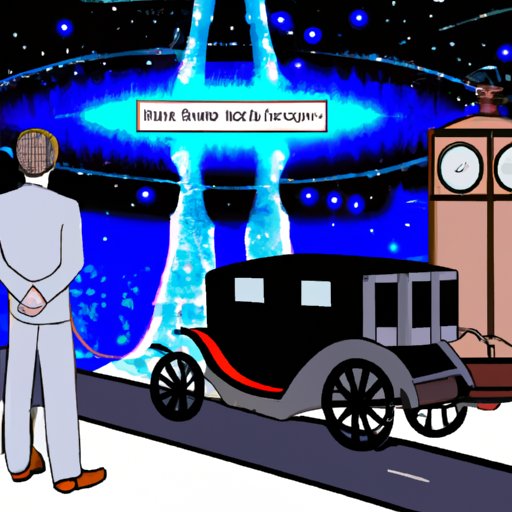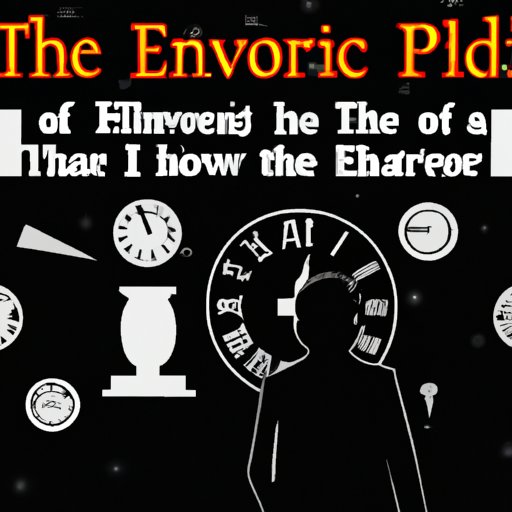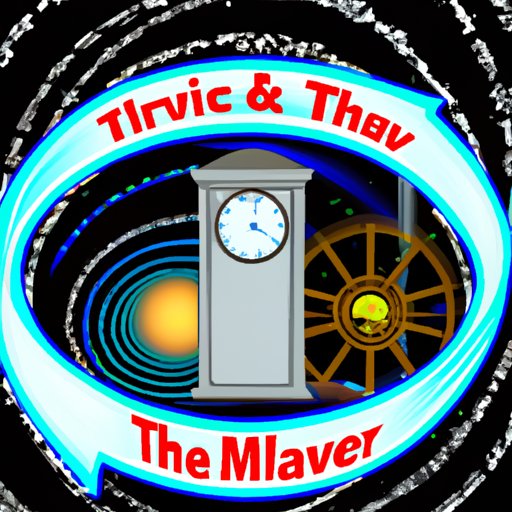Introduction
The concept of travelling through time has been explored in countless stories throughout history, from ancient myths to modern science-fiction films. The idea of travelling back in time, or ‘backwards time travel’, has particularly captured the imagination of many people, but is it actually possible? In this article, we’ll explore the scientific, philosophical and cultural implications of backwards time travel, examining the theoretical possibility of such a feat and evaluating the arguments both for and against it.

Examining the Theoretical Possibility of Backwards Time Travel
Time travel is a fascinating concept that has intrigued scientists for centuries. While some theories suggest that time travel may be possible, there are currently no known methods for achieving it. According to renowned physicist Stephen Hawking, “Backwards time travel might be possible in certain regions of spacetime with unusual properties, such as wormholes, or near rotating black holes.”1 He goes on to say that, “Such regions of spacetime would be highly unstable, so they would not last long enough for a journey to be made.”1 This suggests that while theoretically possible, backwards time travel may not be feasible in practice.
Exploring the Scientific Arguments for and Against Backwards Time Travel
When considering the possibility of backwards time travel, it’s necessary to examine the scientific arguments both for and against it. From a physics perspective, there are several theories that suggest time travel could be achievable, including Albert Einstein’s Theory of Relativity and Kip Thorne’s theory of traversable wormholes. However, these theories also raise questions about the potential implications of backwards time travel, such as whether it would violate the laws of causality and lead to paradoxes.2
On the other hand, there are also several scientific arguments against backwards time travel, such as the Grandfather Paradox. This is the idea that travelling back in time could lead to a situation in which someone might be able to prevent their own birth, resulting in them not existing and thus being unable to travel back in time in the first place.3 While this may seem impossible, some scientists argue that it could be possible in some form or another.4

Investigating the Philosophical Implications of Backwards Time Travel
In addition to the scientific implications of backwards time travel, there are also several philosophical implications to consider. One of the most important issues is the question of causality – if it were possible to travel back in time and change the past, what would that mean for our understanding of cause and effect? Would it be possible to change the course of history, or would we be constrained to follow a predetermined path?5
There are also questions about free will. If one were to travel back in time and make a decision different from the one they had previously made, would they be making a truly free choice, or would they simply be following a predetermined path set by their past self?6 These are difficult questions to answer, and they highlight the complex philosophical implications of backwards time travel.
Evaluating Popular Movies and TV Shows that Feature Backwards Time Travel
Popular culture has long featured stories about time travel, and many of these feature backwards time travel in some form or another. From classic films like ‘Back to the Future’ to more recent shows like ‘Doctor Who’, these stories often explore the implications of travelling back in time and changing the course of history. While these stories can be entertaining, they also present an idealized view of time travel that may not accurately reflect the reality of the situation.
For example, many of these stories portray time travel as a straightforward process that can easily be accomplished with the right technology. However, as we’ve seen, the reality is much more complicated than this. Furthermore, these stories often gloss over the potential consequences of changing the past, such as the potential for paradoxes and violations of causality. As such, while these stories can be entertaining, they should not be taken as an accurate portrayal of backwards time travel.

Analyzing the Impact of Backwards Time Travel on Human Society
Finally, it’s important to consider the potential impact of backwards time travel on human society. If it were possible, it could have a profound effect on science and technology, potentially leading to new discoveries and advancements. It could also lead to new forms of entertainment, as well as new ways of exploring and understanding our past. On the flip side, it could also have a negative impact, such as the potential to disrupt the timeline and change the course of history.
In addition, there is the ethical question of whether backwards time travel should even be attempted. Many scientists argue that it would be irresponsible to attempt such a feat without fully understanding the implications, and that any attempts should be carefully monitored and regulated. Ultimately, the potential impact of backwards time travel on human society is difficult to predict and should not be taken lightly.
Conclusion
In conclusion, the possibility of backwards time travel is an intriguing concept that has captivated the imagination of many people. While there are several scientific theories that suggest it may be possible, there are also many arguments against it. Additionally, there are several philosophical and cultural implications to consider, such as the potential impact on causality and free will, as well as the potential implications for human society. Ultimately, while backwards time travel may be theoretically possible, it is still an open question whether it is feasible in practice.
(Note: Is this article not meeting your expectations? Do you have knowledge or insights to share? Unlock new opportunities and expand your reach by joining our authors team. Click Registration to join us and share your expertise with our readers.)
